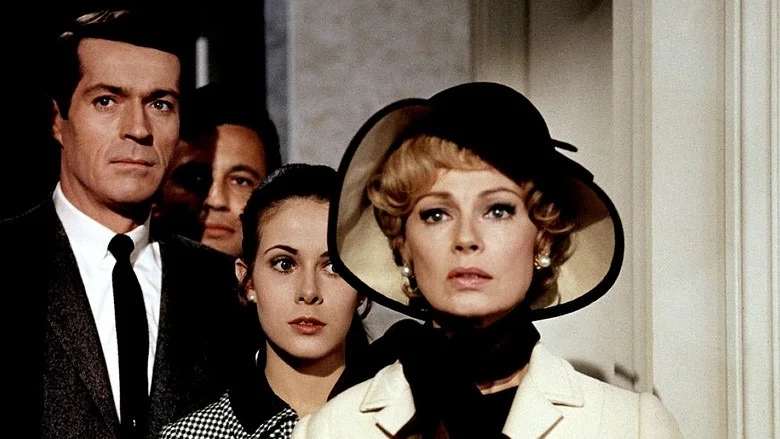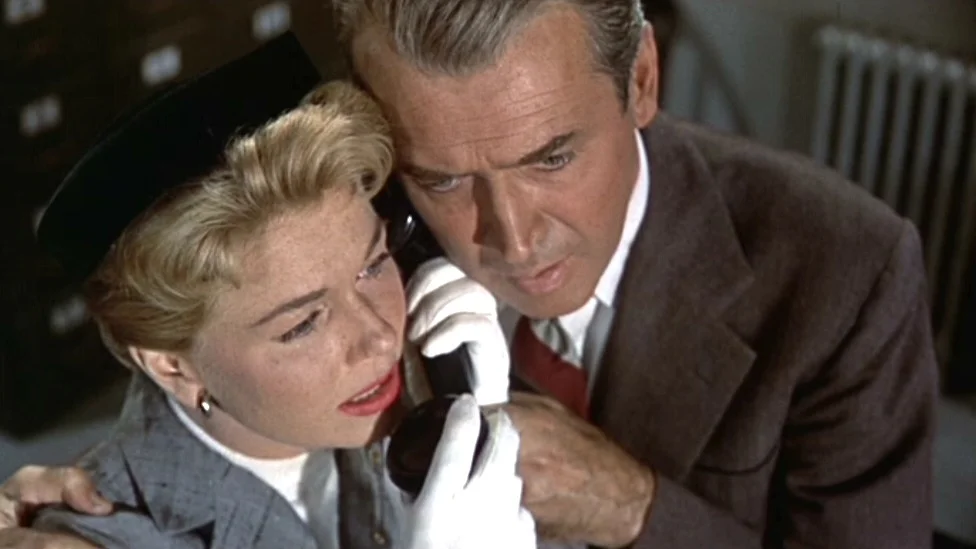Beginner’s Guide to Alfred Hitchcock: Torn Curtain (1966)
There is a kind of movie that isn’t really good but plays well on cable channels like TNT or FX. These movies are good for a lazy Saturday afternoon, neither great enough to drop everything for nor terrible enough to make you turn it off. For me, Alfred Hitchcock’s Torn Curtain falls into that category. Certainly, Hitchcock made other films that fans consider mediocre, but this 1966 movie is a straitlaced “dad thriller”. Torn Curtain reminded me of movies like The Bourne Legacy and Jack Reacher—easy enough to enjoy but you could watch it a dozen times and forget what happens with each rewatch.
Torn Curtain stars Paul Newman as an American rocket scientist, Michael Armstrong, who defects to East Germany. Followed by his determined assistant/fiancée Sarah Sherman (Julie Andrews), Michael travels behind the Iron Curtain—actually as a double agent against East Germany—to learn how much the Soviet Union knows about anti-missiles. Michael is sent to talk to scientist Gustav Lindt (Ludwig Donath) and then flee back to America.

As run of the mill as Torn Curtain is, there is one knockout scene that grabs your attention: the murder of East German officer Gromek (Wolfgang Kieling) by Michael and the wife of one of his contacts, played by Carolyn Conwell (the contact is a farmer played by Mort Mills). Hitchcock stages the scene brutally, realistically, and without any music. It’s quite a shocking sequence that shows how difficult and grueling it can be to kill someone. Hitchcock created the sequence as a direct response to spy movies of the time where someone is assassinated too easily. The murder is aggressive and hard to watch, but it showcases Hitchcock’s creativity in building suspense.
There are other sequences that are effectively crafted, such as the scene on the decoy bus. But for the most part, Torn Curtain is a bit of a slog. Acclaimed novelist Brian Moore wrote the screenplay, but some of his structural decisions don’t work very well. The film is divided into three parts, with the first part from the point of view of Julie Andrews, which slows the pace since she’s not the protagonist. The third part features an extended scene with a Countess desperate to go to America, played by Lila Kedrova (with whom Hitchcock struck a friendship on set), and that grinds the film to a halt. Aside from a few clever moments here and there, Torn Curtain just doesn’t have that Hitchcockian flourish.
Hitchcock’s career was in a bit of a slump at the time. Marnie had disappointed critics and audiences in 1964, and his battle with Tippi Hedren took a toll on him. Hitchcock was forced to cast Julie Andrews and Paul Newman because they both were household names in 1966 (and he probably got a kick out of introducing these wholesome stars naked in bed). While Hitchcock, Andrews, and Newman got along, I don’t think Hitchcock liked working with the actors beyond professional courtesy. The performances are good because Newman and Andrews are both exceptional actors, but there’s no excitement or electricity between them.

Hitchcock also wasn’t working with any of his usual crew. In fact, he even fought with his longtime composer Bernard Herrmann over the score. Hitchcock reportedly wanted a jazz/pop score to keep up with cinematic trends. Herrmann, however, wrote the score how he wanted it, insisting that a more populist score wouldn’t suit Hitchcock. Hitchcock demanded he change the score, but Herrmann refused because he always had creative control over his music. Oscar winner John Addison (Tom Jones) replaced Herrmann, and his score is good but unmemorable.
Torn Curtain is a fine movie. It has its charms and a few really terrific sequences. I don’t really consider this to be an ambitious Hitchcock film. It is interesting to see the director afraid his best days are behind him and forced to work under circumstances he didn't like. Maybe Torn Curtain drags because Hitchcock was so unexcited making it, so unhappy—and the Gromek murder was the only part unique enough to jolt him awake. It’s a testament to Hitchcock that the film works despite the trouble behind the camera.
The final installment of our long running column aptly finds Manish exploring Hitch’s final film, this black comedy starring Bruce Dern and Karen Black.
Hitchcock’s dabbling in the screwball comedy arena is more interesting than entertaining but has a terrific lead performance from Carole Lombard.
Even with an ambitious opening and a phenomenal performance from Marlene Dietrich, this mystery is ultimately middle-of-the-road Hitchcock.
A look at the charming and visually inventive romantic comedy from Hitchcock’s silent era.
While this early film from Hitchcock has hints of where his career was headed, it’s one of his least compelling efforts.
One of Hitchcock’s last films, Topaz is an overlong but often exciting spy thriller.
In our Beginner’s Guide to Hitchcock, we take a look at a little known musical (!) called Waltzes From Vienna.
This lackluster romantic drama from Hitchcock’s silent era would have benefitted greatly from being made later in his career.
A dry and predictable mystery thriller that, despite a stellar cast, is rightfully considered lesser Hitchcock.
Hitchcock ends one phase of his career with this, unfortunately unmemorable, film.
The movie involves a chorus girl, but the story behind the scenes is much more interesting.
This WWI-set espionage thriller has some similarities to a superhero blockbuster.
Murder and theatrics are on deck with a truly interesting early Hitchcock film.
Don’t let the title confuse you, this is Hitchcock film that’s very much an “assignment film”.
Hitchcock’s early screwball comedy shows signs of his knack for visual humor.
This Oscar-nominated Hitch thriller set its psychological game in the battlefield of a marriage.
This forgotten attempt at parody from Hitch should probably stay that way.
Hitchcock wasn’t too fond of this, his final silent film, but it still holds some of his trademark flourishes.
This Henry Fonda starrer is one of Hitch’s least stylish and most grounded works.
Manish takes a look at his favorite film and its meaning in the #MeToo era.
Despite gorgeous cinematography and a strong performance from Ingrid Bergman, this is still lesser Hitch.
This film from Hitchcock's silent era is one of the very first boxing pictures.
Hitchcock's thrills lift up the nothing-special plot in this pre-war thriller.
An early Hitchcock film from the silent era that is for completists only.
Jimmy Stewart stars in Hitchcock's remake of his 1934 film The Man Who Knew Too Much.
Peter Lorre stars in this iconic thriller/comedy.
Manish explores this "lesser" Hitchcock which is the most patriotic film he ever made.
Sylvia Sidney's commanding lead performance is just one of the pleasures of this 'lesser' Hitch thriller.
While there are interesting elements, this silent era Hitchcock is not an essential work in his career.
Hitchcock brings the laughs in this worthwhile outing.

































